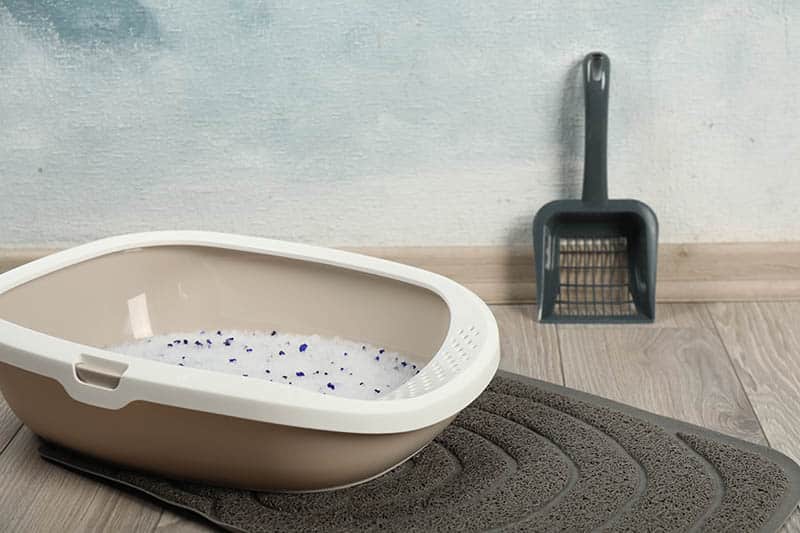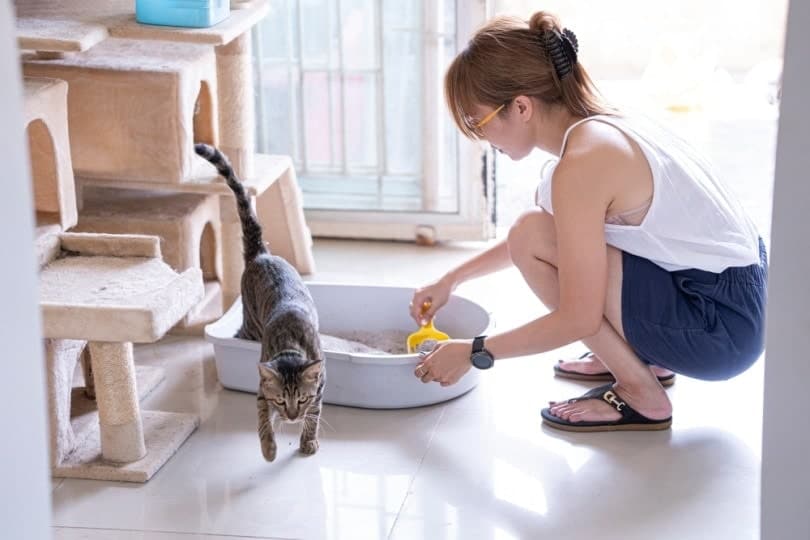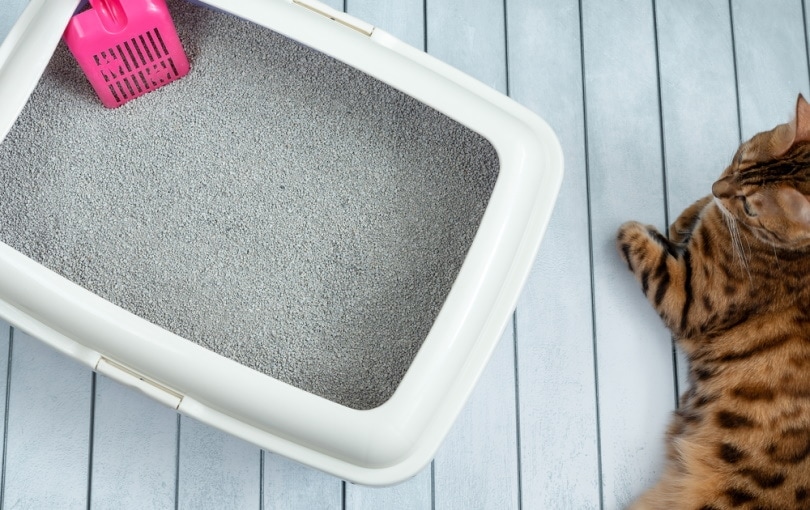Welcoming a new baby into the family is an exciting time. Not only are the new parents filled with joy, planning for the future, and getting things ready, but the pets inside the home are feeling the exciting change in the atmosphere. During this time, it’s also natural for the expecting parents to dote more on their pets and show them they are still part of the family.
Unfortunately, however, certain things must change for cat parents. Cleaning your cat’s litter is one of those things. While some myths claim pregnant women shouldn’t be around a cat during their pregnancy, the true issue is a cat’s litter box. It is important that you avoid cleaning, or changing your cat’s litter when you’re expecting your own bundle of joy due to the potential of spreading diseases. Let’s learn more about cats and pregnant women so expecting families can better prepare for the arrival of their new baby and properly care for their kitties at the same time.

The Big Concern About Litter Boxes
While you hear experts say avoiding a cat’s litter box during pregnancy is recommended, it isn’t common to hear why. The reason is a parasitic infection called toxoplasmosis. Toxoplasmosis can be transmitted through a cat’s waste. And where do our indoor cats eliminate themselves? You got it: In their litter boxes. Now, you may instantly think toxoplasmosis is dangerous to the mother. While it is, that isn’t the biggest concern. For adults, this infection causes symptoms similar to that of the flu. In most cases, symptoms are relatively mild, so mild that many people have had toxoplasmosis and never knew it.
For pregnant women, the symptoms of toxoplasmosis may be barely noticeable. Unfortunately, however, pregnant women can pass the infection onto their babies. For unborn babies, this infection is much more serious, especially in the earlier stages of pregnancy. Unborn babies can suffer brain damage, and even damage to their eyes when they are infected. It is even possible for women to pass toxoplasmosis to their babies if they have been infected before pregnancy, though specific medical advice should be obtained through your doctor.

How Cats Contract Toxoplasmosis
Now that you understand how dangerous a cat’s litter box can be for an unborn baby, it’s important to understand how cats potentially contract this infection. We’ve all seen cats chase mice, birds, and other types of small animals. It’s in their nature as born hunters. It’s this instinct that can cause them to become infected. Most cats pick up toxoplasmosis from eating rodents or other small animals after their hunt. Your kitty can also pick up this parasite from eating raw or undercooked food.
Once a feline has contracted toxoplasmosis it can shed parasites for weeks in its waste. This makes the litter box especially dangerous for pregnant women, but it isn’t the only area you should pay close attention to. Cats that go in and out of the house are known to scratch and eliminate in sandboxes and even your garden. This is why it is important to keep the kids’ sandbox covered when not in use and to wear gloves when doing any kind of outside work, especially gardening, when pregnant.

The 8 Helpful Tips on Living with a Pregnant Cat
No, of course not! There is no need to say goodbye to your kitty during pregnancy. It is also hard to stay away from your pet. We know how persistent cats can be. They aren’t going to let you ignore them. Steering clear of your kitty isn’t good for it. Cats hate change and if they feel you’re pushing them away they can become depressed or act out in hopes of getting your attention. Instead, you can follow a few safety tips to keep yourself and your unborn baby safe during this special time.
Let’s take a look at those tips below:
1. Avoid the litter box
If you have no one to tackle this task during pregnancy, wear gloves and wash your hands immediately once you’re finished.
2. Keep the litter box clean
Toxoplasmosis generally isn’t infectious in the first day or so after being passed in stool. If the litter box stays scooped and changed, it lessens your chances of being exposed.

3. Only feed your cat commercial kibble and wet food
Undercooked or raw food can expose your kitty to the parasite.
4. Stay away from stray cats and kittens
You should also avoid adopting a new cat during pregnancy. It is difficult to determine whether a cat you aren’t familiar with could be carrying the parasite.
5. Wear gloves anytime you’re taking part in other activities such as gardening
Always use gloves in activities where your hands come into contact with the soil. Wash your hands immediately when you’re finished with your task.

6. Cover sandboxes
This will keep cats from eliminating inside them.
7. It’s natural for your kitty to hunt
They see it as their job. If your kitty happens to catch a mouse or other small animal, have it taken away immediately to avoid them eating it.
8. Keep cats indoors if possible
Yes, some cats simply must play outside, but if they are willing, allow them to stay inside throughout your pregnancy to avoid potential exposure.


Final Thoughts on Pregnancy and Litter Boxes
While you and your unborn baby should avoid your cat’s litter box during pregnancy, that doesn’t mean avoiding your kitty altogether. You can still have a loving relationship with your cat while you’re pregnant. If possible, give your partner the task of scooping and changing the litter box. If that isn’t an option, do it safely by wearing gloves and washing your hands thoroughly afterward. There are medications pregnant women can take if they become infected with toxoplasmosis. This can help both mother and child. If you feel you’ve been infected during your pregnancy or been treated for infection, allow your baby’s doctor to closely monitor them for any potential issues that may arise.
Featured Image Credit: Africa Studio, Shutterstock
- 1 The Big Concern About Litter Boxes
- 2 How Cats Contract Toxoplasmosis
- 3
- 4 The 8 Helpful Tips on Living with a Pregnant Cat
- 4.1 1. Avoid the litter box
- 4.2 2. Keep the litter box clean
- 4.3 3. Only feed your cat commercial kibble and wet food
- 4.4 4. Stay away from stray cats and kittens
- 4.5 5. Wear gloves anytime you’re taking part in other activities such as gardening
- 4.6 6. Cover sandboxes
- 4.7 7. It’s natural for your kitty to hunt
- 4.8 8. Keep cats indoors if possible
- 5 Final Thoughts on Pregnancy and Litter Boxes





